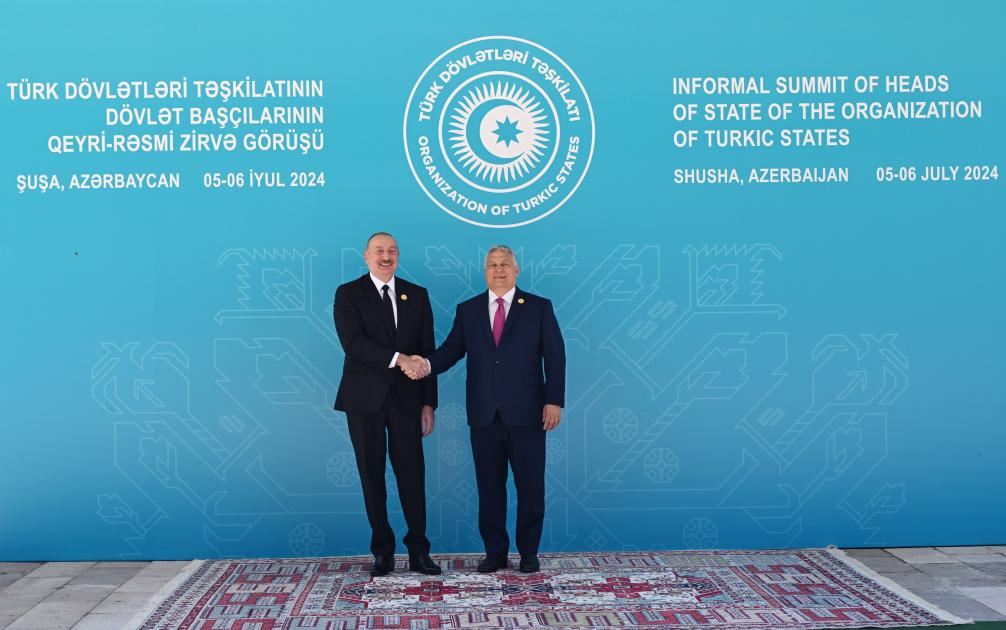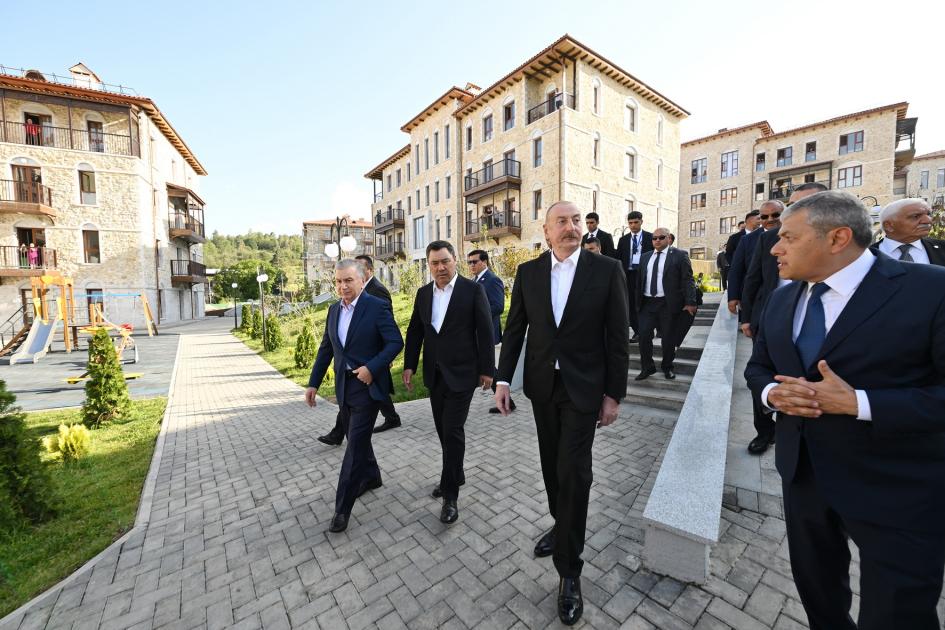Constructive force in collapsing world Organisation of Turkic States’ summit in Azerbaijan’s Shusha
The informal summit of the Organisation of Turkic States was held in Azerbaijan’s Shusha city on July 6 amid the growing importance of the organisation’s member states on the global stage.
The new geopolitical reality has strengthened the Turkic countries amid the severance of countless international ties in Eurasia and the Middle East.
As a result, these countries have become key partners for the East because without them the Shanghai Cooperation Organization (SCO) weakens and the Collective Security Treaty Organisation (CSTO) loses its significance.
They are also important for the West - without them, Europe will lose the most important routes to Asia and vital sources of energy.
It depends on the Turkic countries whether to simply take advantage of emerging opportunities while they exist or to take control of the processes - defending and consolidating their new role in the world and rebuilding the international order in their region and beyond.
The Organisation of Turkic States has a moral right to this and even bears some responsibility to humanity, which the superpowers of the West and East have brought to the current economic and political catastrophes and are driving further to the nuclear war or climate collapse.
Response to the failure of Western globalisation
The presidents and vice-presidents of the member states of the Organisation of Turkic States, namely, Azerbaijan, Kazakhstan, Kyrgyzstan, Türkiye and Uzbekistan, gathered at the summit in Shusha on July 6.
The presidents of observer states to the Organisation are also present as observers. Azerbaijani President Ilham Aliyev said during the inauguration on February 14, 2024 that the Organisation of Turkic States is one of the priorities for Azerbaijan’s foreign policy.
“This is the main international organisation for us, because it is our family. We have no other family. Our family is the Turkic world. If anyone thinks that we should look for a family elsewhere, then I can say that nobody is waiting for us anywhere and they openly say this,” he said.
The summit in Shusha served as a conceptual and practical development of this statement.
The Organisation of Turkic States will have to set itself tasks that are advanced in their content and unite its members as an advanced bloc in fulfilling these tasks both at the regional and global levels to build a common future, and not plunge into hopeless nostalgia about the legendary past and common roots.
Only this way, through working on issues that will benefit both the Organisation of Turkic States itself and entire humanity, is it possible to develop healthy solidarity and integration of the Turkic world, which will become the vanguard, by cooperating with other countries wishing to participate in relevant efforts. Hungary can be cited as an example.

Such conclusions can be drawn from the agenda of the Shusha summit.
Its main topic was “Transport network and building a sustainable future amid the climate change”. It brings together the issues that are important for the members of the Organisation of Turkic States, for the continent, and for the world.
Firstly, the development of transport infrastructure in the region will allow the Turkic countries to more successfully solve the problems of creating routes between Europe and the Middle East on the one hand and the Far East on the other.
The matter rests in those flows that previously passed along more northern (via Russia and Eastern Europe) and southern routes (via Suez Canal).
An agreement on simplified customs corridors was signed at the Samarkand summit in 2022. Azerbaijan became the first country which began implementing it last year.
When Turkic countries establish new relations among the regions, they not only create new sources of income for themselves, but get a chance to influence major global processes.
The complaints about increasing “deglobalisation” have been recently heard on all Western global platforms - from the World Economic Forum in Davos to the International Monetary Fund and the World Bank.
The World Trade Organisation (WTO) invents various formulations such as defragmentation and division into blocks just not to call a spade a spade. Although it is high time to speak directly about the collapse of liberal globalisation, built by the West in its own interests.
In these circumstances, the Turkic countries can unite several key regions of the planet, taking into account that the previous routes were severed.
This will mitigate the consequences of the collapse of Western-centric globalisation and transform it into new forms.
The Turkic countries will determine them and this participation is the fundamental difference between the new globalisation and its previous versions, promoted by world empires and superpowers.
Secondly, the leaders of the Turkic countries are discussing adaptation measures to climate change in Shusha.
Although the Western world has switched from the problems of climate change to the issues of waging war against global competitors. The climate change process is obvious by natural anomalies and will ultimately call into question the survival of humanity.
Climate change is affecting almost all member states of the Organisation of Turkic States, as well as all countries with arid climate.
Returning climate change issues to the global agenda means not only raising the banner of the struggle for the interests and survival of the absolute majority of humanity, but also protecting the interests of the Turkic member states.
Energy resources for Europe and approaches to China and India
Do the Turkic countries have the necessary resources and strong enough positions to have such ambitious goals? Their level of development is really different and everyone has problems. However, the capabilities of the member states of the Organisation of Turkic States have recently increased due to global upheavals.
The summit of the Organisation of Turkic States looks like a timely strong-willed step to develop common positions amid the growing role of the Turkic member states in connection with the shortage of energy resources in the EU caused by the refusal of Russian gas.
Moreover, the EU is trying to conclude a contract with the Russian Gazprom company for supplies in the new year or to increase gas supplies from Azerbaijan via the Trans-Anatolian Natural Gas Pipeline.
Such an increase in supplies in the future entails the development of infrastructure for pumping and joining of Central Asian Turkic states as suppliers.

However, the most important context for the summit of the Organisation of Turkic States was the recent summit of member states of the Shanghai Cooperation Organisation (SCO) in Astana.
The member states of the organisation confirmed in the declaration adopted in Astana that the core of the organisation is Central Asia, in other words, predominantly Turkic countries.
It is difficult to overestimate the significance of this fact. After all, the SCO is not just a “Chinese project”, but also an association of ten countries, in which even such big countries as Russia, Pakistan, India and Iran are intensively working.
These countries are home to more than 42 per cent of humanity and produce 32.6 per cent of global GDP (at purchasing power parity).
The results of the Astana meeting, at which not only a rather substantive declaration, but also 24 cooperation agreements were signed, also testify to the growth of interaction.
Azerbaijan also took part in the Astana meeting as a SCO dialogue partner since 2016.
Thus, the agenda of the summit in Shusha is interconnected with previous diplomatic steps by the Azerbaijani leadership.
The meeting will one way or another help the Turkic countries coordinate their positions in relation to the SCO and China - after all, the Central Asian states have been involved in Chinese global projects for a long time.
By developing their consolidated position or at least conducting consultations on the development of routes in a key region of the planet for Beijing, member states of the UTC and their allies do not form some destructive opposition. On the contrary, their consolidated position developed in this way will speed up the decision-making processes in the SCO.
Of course, such a position will allow them to protect their interests within the SCO. Even the closest allies sometimes argue harshly in international politics and this only benefits the development of mutually respectful and equal relations. The history of the US-Israel relations is full of such examples.
The importance of the Turkic states for China is difficult to overestimate. Historically, the periods of the heyday of Chinese statehood and the rise of the Turkic countries of Central Asia often coincided in time and probably contributed to each other.
Researcher from Uzbekistan Dilnoza Duturaeva has recently published a book about China’s relations with the outside world through the Turkic lands in the Middle Ages, more precisely with the then Middle East and Europe, as well as about China’s stability.
Moreover, she emphasises that that Silk Road existed thanks not only to the Uyghurs, but also to the Uzbeks and Kazakhs.
The decline of China and the Turkic countries was observed after the Europeans were building a sea route to the Far East and establishing Western control over these sea routes.
This affected all the countries located along the Great Silk Road - from Central Asia to the Caucasus and the Ottoman Empire.
These countries amid the weakening of the West have a historic chance to once again increase their significance in world politics and economics, again, albeit in a new way, by building continental routes.
The current development of the Organisation of Turkic States from the founding of the Turkic Council in 2009 to its expansion through Uzbekistan's accession in 2018 and reformatting in 2021 has paralleled China's Belt and Road Initiative.
In some way, it prepared the Turkic countries to develop collective Turkic responses to Chinese initiatives, to take steps towards them - but not hasty steps, at the first signal of Beijing, but balanced and sovereign ones, leading to a joint movement towards them.
On a global scale, the Turkic countries now have a real chance of determining many components of the new world order. Europe, the Russian Federation, China and a number of other big countries will have a hard period without partnership with the Turkic countries.
The world’s chances of avoiding global carnage will sharply decrease without the Turkic countries’ active constructive role in countering the tearing of the world economy by greedy imperialist states and in restructuring international relations.
The same refers to the politics. Today the most realistic option for starting negotiations on ending the Russian-Ukrainian war has once again become the results of the negotiations in Istanbul, achieved once thanks to the mediation of the Turkish leadership.
The views and opinions expressed by the hired political analysts in their articles may differ from and do not always reflect the views of Caliber.Az.








